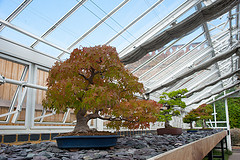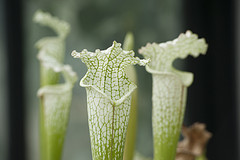22nd March 2013 New Delhi, India
Joining hands in conserving earth’s plant riches
Extinction is forever – something that happens to several plant species each year. They disappear without any chance of being replaced, many before their potential to help us has been fully assessed. The urgency of plant conservation was brought home to me after my interactions with Hugh Pritchard, who heads the Research, Seed Conservation and Senior Science Group in Royal Botanic Gardens, Kew.
I have been privileged to get a fair amount of understanding of Kew’s science and conservation work with these regular interactions with Hugh and his colleagues including a visit to Kew Gardens last summer. The good news is that Kew has teamed up with India’s National Bureau of Plant Genetic Resources (NBPGR) for a long-term partnership in research and human resources development. This involves Indian and international institutions in various aspects of plant conservation biology. As part of the Indian Council of Agricultural Research (ICAR), NBPGR is the nodal agency for the plant genetic resources activities in India. They recently held two week international training Course on Plant Conservation Biology: Science and Practice from 1-14 March in NBPGR, Delhi had faculty from both Kew and India participating. We invited Rahul from India and Lhab from Bhutan, two of the trainees on the course, to share their experience… 
‘Nature’s resources are gifts wrapped for the world to enjoy’, explains Dr. Krishna Kumar (DDG, Horticulture) of ICAR during his opening remarks at the International Training Course on “Plant Conservation Biology; Science and Practice”. Realizing the rapid loss of these gifts and the need for collaborative action, the Royal Botanic Gardens, Kew and the NBPGR organized this specialized two-week course from 1-14 March, 2013 to develop the capacities of people working in the field of plant conservation.
Over the duration of these two weeks, the course gathered 18 of us from 10 different countries (mainly Asian) all belonging to diverse cultures and work backgrounds. Incidentally, what started off as formal discussion at the beginning of the course soon became informal lengthy conversation; brewing novel ideas to take back home and reproduce in our respective workplaces.
 The training was led by a group of experienced and learned scientists who outlined the processes and systems of conservation. In fact, the entire course was loaded with an array of lectures and practical sessions that left no room for boredom amongst the young enthusiastic bunch of us. Even more, on two occasions we had the unique opportunity of out-of-class visits; one to the Taj Mahal at Agra and another to the Yamuna Biodiversity Park, a man made ecological sanctuary. They both were jaw-dropping sights and secretly reminded us of the richness of diversity both culturally and biologically.
The training was led by a group of experienced and learned scientists who outlined the processes and systems of conservation. In fact, the entire course was loaded with an array of lectures and practical sessions that left no room for boredom amongst the young enthusiastic bunch of us. Even more, on two occasions we had the unique opportunity of out-of-class visits; one to the Taj Mahal at Agra and another to the Yamuna Biodiversity Park, a man made ecological sanctuary. They both were jaw-dropping sights and secretly reminded us of the richness of diversity both culturally and biologically.
All the participants expressed the benefit of such trainings as they generated a wealth of knowledge exchange. Our many thanks go out to every individual who made this course happen.
Antao Rahul Mark (India)
Lhab Tshering (Bhutan)
Excellent !! Keep it up bro….
Nice one Lhab… Keep it Up..
Thanks for god and helping me to participate this nice training “Plant Conservation Biology, Science and Practice” at NBPGR in Delhi, India. I was myself one of trainee for this 14 days training programme. It was excellent training for me. I gathered knowledge from this course at NBPGR in collaboration with Royal Botanic Gardens, Kew, UK. The teaching faculty from Royal Botanic Gardens, Kew, UK was so so excellent and broad. I gathered my knowledge from them very excellent teaching and practically so skills. I could not forget specially Dr. Hugh Pritchard, Miss Clare Trivedi and Dr. Peter Toorop from Royal Botanic Gardens,Kew, UK and organizers Dr. K.C Bansal, Director, NBPGR ,Dr. Rekha Chaudhury and Dr.Sk Malik, NBPGR,Delhi,India . In our organization take initiative to take small scale project for establishing molecular lab with cryopreservation lab for conserving our threatened germplasm in Bangladesh. Kamal Uddin Ahamed, Scientific Officer, Plant Genetic Resources Centre, Bangladesh Agricultural Research Institute (BARI), BANGLADESH
Thank you very much for all your efforts in publishing it …….It is all nicely put and made really beautiful to view and read…….
Very nice comments
Many thanks Goutam. And thank you Dr Kudlip for your comment, and for taking part. It sounds like a great time had by all! Tom
nicely composed
Myself one of the trainee for this 2 weeks course. We all really learned lot from this Plant Conservation Course at NBPGR in collaboration with RBG Kew UK. The teaching faculty from RBG and NBPGR was tremendous. They have very good teaching and practical skills. I really want to thanks Dr. Hugh Pritchard, Miss Clare Trivedi and Dr. Peter Toorop from RBG Kew UK and organisers from NBPGR Dr. Rekha and Dr. SK Malik. At our organization we are going initiate such projects on small scales towards the conservation of seeds of Wild Plants (rare, endangered, endemic, vulnerable) of India.
Dr. Kuldip Dogra Scientist ‘B’ Botanical Survey of India (MOEF)